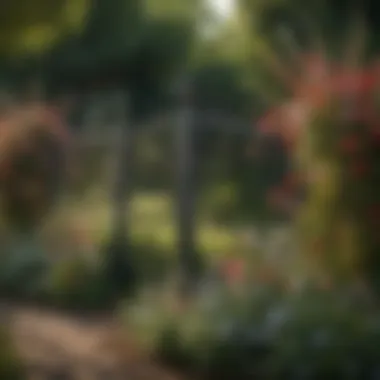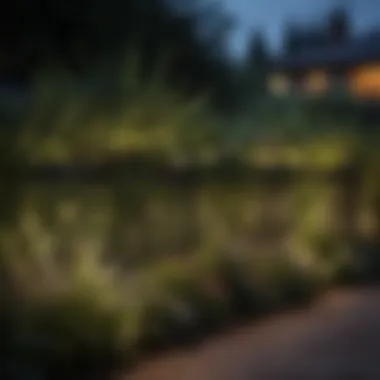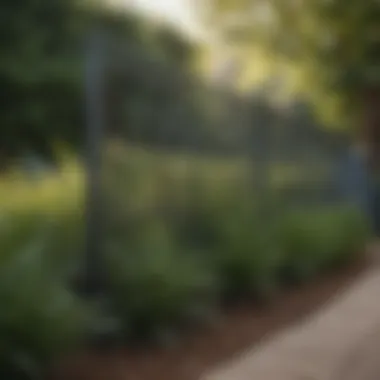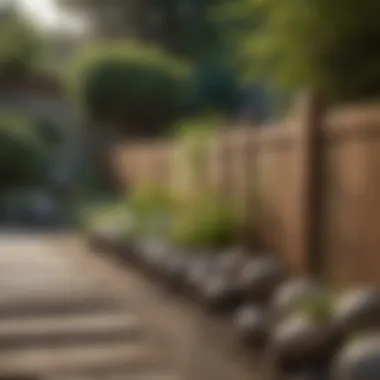Elevate Your Outdoor Space: The Ultimate Garden Fencing Guide


Outdoor Decor Ideas
Gardens are not just outdoor spaces; they are extensions of our homes, places where nature meets design, and fencing plays a pivotal role in shaping their aesthetics and functionality. As you embark on the journey of enhancing your garden with fencing, consider blending it seamlessly with seasonal inspirations. These could include integrating furniture selection for both form and function, incorporating decorative lighting to illuminate pathways and focal points, experimenting with plant arrangements to create visual interest and harmony, exploring hardscaping solutions for added texture and depth, and embracing sustainable practices for a more eco-conscious approach.
Beyond mere boundaries, garden fences can elevate the ambiance of your outdoor space, transforming it into a sanctuary of beauty and tranquility. By meticulously curating outdoor decor ideas that complement your fencing choice, you can create a harmonious blend of nature and design.
Outdoor Entertaining
When it comes to outdoor entertaining in a garden adorned with elegant fencing, the possibilities are endless. Imagine hosting luxurious gatherings amidst lush greenery and tasteful decor. To elevate your hosting skills, consider incorporating party planning tips that ensure seamless events, along with embracing al fresco dining trends that blend gastronomy with nature's splendor. Your garden transformed by fencing can become the ideal setting for memorable celebrations and intimate gatherings that leave a lasting impression on your guests.
Exclusive Destinations
Your garden, enhanced by thoughtfully chosen fencing, can become an exclusive destination in itself. Unveil hidden gems within your outdoor oasis, where luxury resorts or private villas pale in comparison to the personal touch and charm of your curated space. With fencing as the cornerstone of your garden's identity, every corner becomes a secret haven, inviting exploration and relaxation.
Travel Guides
As you navigate the realm of garden fencing, akin to a cultural experience, delve into the nuances of culinary adventures within your outdoor sanctuary. Embrace the freedom of shopping escapades as you select the perfect fencing that mirrors your style and aspirations. Let your garden guide you on a journey of discovery, where every element intertwines to form a tapestry of beauty and functionality.
Home and Interiors
The landscape of your garden, defined by the fencing choices you make, becomes an extension of your home and interiors. Explore the latest interior design trends as you contemplate the design elements that resonate with your outdoor oasis. Consider home organization techniques that seamlessly blend indoor with outdoor spaces, all while embracing smart home innovations that elevate your garden's functionality.
Introduction
Gardens are often considered a sanctuary, a place of peace and tranquility. Fencing plays a crucial role in enhancing the overall appeal and functionality of a garden. Whether you aim to boost security, increase privacy, or add an aesthetic touch, selecting the right kind of garden fencing is paramount in achieving your desired outdoor space. This comprehensive guide will provide expert insights and practical tips on every aspect of enhancing your garden with fencing.
Understanding the Significance of Garden Fencing
Securing your property
Securing your property through garden fencing is vital for safeguarding your outdoor space. By defining the boundaries clearly, fencing helps prevent unauthorized access and protects your property from intruders. The sturdy construction and height options ensure increased security, making it a popular choice among homeowners looking to fortify their premises.
Enhancing privacy
Privacy is a key consideration when designing a garden oasis. Fencing provides a barrier against prying eyes, allowing you to enjoy your outdoor space without intrusion. The strategic placement and design of fences create a peaceful retreat within your property, shielding you from outside disturbances and creating a sense of seclusion.
Adding aesthetic appeal
Beyond functionality, garden fencing contributes significantly to the visual appeal of your outdoor area. With various materials and styles available, you can choose a fence that complements your garden's design theme. From traditional wooden fences to modern metal options, each adds a unique charm to the landscape, enhancing the overall aesthetic of your garden.
Overview of Fencing Materials
Wood
Wood fencing is a classic choice known for its natural look and versatility. Its rustic charm adds warmth to the garden, blending seamlessly with different styles. While wood requires regular maintenance to prevent rot and decay, its aesthetic appeal makes it a popular option among homeowners seeking a traditional yet elegant fencing solution.


Metal
Metal fencing offers durability and strength, ideal for those prioritizing security and longevity. With multiple design possibilities, metal fences can range from intricate wrought-iron styles to sleek aluminum panels, catering to various aesthetic preferences while ensuring longevity and low maintenance.
Vinyl
Vinyl fencing is a low-maintenance alternative that provides the look of wood without the upkeep. Resistant to rot, fading, and insects, vinyl fences offer long-term durability and aesthetic appeal. Available in various colors and styles, they are a practical choice for homeowners seeking a virtually maintenance-free solution.
Composite
Composite fencing combines the benefits of wood and plastic, offering a durable and eco-friendly option. With the look of wood and the durability of plastic, composite fences require minimal maintenance while providing excellent resistance to weather conditions. They present a sustainable choice for those looking to enhance their garden with a long-lasting and environmentally conscious fencing solution.
Factors to Consider Before Installing Garden Fencing
Local regulations
Before installing garden fencing, it is crucial to familiarize yourself with local regulations and guidelines. Certain areas may have specific height restrictions, material requirements, or permit procedures that need to be followed. Adhering to these regulations ensures compliance and prevents potential legal issues.
Budget
Setting a budget for your fencing project is essential to determine the scope of work and materials you can afford. Costs can vary based on the selected material, design complexity, and installation requirements. By establishing a clear budget upfront, you can streamline the decision-making process and avoid financial surprises during the project.
Aesthetic preferences
Considering your aesthetic preferences when choosing garden fencing is key to achieving a cohesive look for your outdoor space. Whether you prefer a modern, minimalist design or a more traditional style, selecting a fence that aligns with your taste and complements the existing landscape will enhance the overall appeal of your garden. Taking into account colors, textures, and design elements will help create a harmonious and visually pleasing outdoor environment.
Selecting the Ideal Height and Style
When designing a garden fence, careful consideration of height and style forms the cornerstone of a cohesive and visually appealing outdoor space. The ideal height of your fence plays a significant role in defining boundaries, ensuring security, and optimizing privacy while blending harmoniously with your home architecture. Matching the fence style to your home's design aesthetic further enhances the overall visual coherence of your property.
Height considerations
Determining the optimum height for your garden fence hinges on various factors such as the intended purpose, local regulations, and aesthetic preferences. The key characteristic of height considerations lies in striking a balance between functionality and visual appeal. Choosing a taller fence bolsters security and privacy, ideal for urban environments or properties requiring additional seclusion, while a lower fence can create a more open and welcoming ambiance. Selecting the correct fence height is vital to creating a harmonious outdoor space that aligns with your practical needs and aesthetic vision. However, taller fences may elicit a sense of enclosure and seclusion, potentially affecting the perceived spaciousness of smaller gardens.
Matching fence style to home architecture
Harmonizing your fence style with your home's architecture is pivotal in creating a cohesive and visually pleasing exterior landscape. The key characteristic of matching fence style to home architecture lies in creating a seamless transition between indoor and outdoor spaces while enhancing the overall curb appeal. Opting for a fence design that complements your home's architectural features, whether modern, traditional, or eclectic, ensures a harmonious visual flow. This choice not only enhances the aesthetic coherence of your property but also adds to its overall resale value. However, it's essential to strike a balance between blending with existing architectural elements and introducing unique design touches to create a distinctive outdoor setting.
Maintenance Requirements
Ensuring the longevity and visual appeal of your garden fence entails adhering to regular maintenance practices tailored to preserve its structural integrity and aesthetic allure.
Regular cleaning
Regular cleaning forms the foundation of maintaining a pristine and well-cared-for garden fence. The key characteristic of regular cleaning lies in removing dirt, debris, and environmental grime that can accumulate over time, compromising the fence's appearance and durability. Implementing a cleaning routine involving gentle washing with mild soap and water or specialized fence cleaners helps prevent discoloration and surface damage, extending the fence's lifespan. Regular cleaning not only enhances the fence's visual appeal but also contributes to a healthier outdoor environment by eliminating mold and mildew growth. However, it's important to avoid abrasive cleaning methods that could scratch or damage the fence surface, compromising its integrity.


Repairs and treatments
Addressing repairs and necessary treatments promptly is essential in preserving the structural integrity and functionality of your garden fence. The key characteristic of repairs and treatments lies in identifying and rectifying issues such as loose boards, missing hardware, or signs of damage promptly. Conducting routine inspections to detect early signs of wear and tear enables timely interventions, preventing minor issues from escalating into costly repairs. Implementing regular maintenance treatments such as sealants, stains, or protective coatings adds an extra layer of defense against environmental elements, prolonging the fence's lifespan. Proper repairs and treatments not only enhance the fence's durability but also contribute to the overall visual appeal of your garden. However, neglecting repairs or treatments can lead to accelerated deterioration and compromise the fence's structural integrity, necessitating more extensive and costly interventions in the future.
Installation Process
In the realm of garden enhancement, the Installation Process stands as a pivotal stage that sets the foundation for a secure and aesthetically pleasing outdoor space. This crucial step involves a series of meticulous tasks that contribute to the overall functionality and visual appeal of the garden fence. Proper installation ensures that the fence is sturdy, durable, and able to withstand external elements over time. Through a methodical approach to installation, homeowners can rest assured that their garden will not only look stunning but also provide the necessary security and privacy.
Preparing the Site
Marking boundaries
When it comes to the essential component of Marking boundaries, it plays a decisive role in delineating the specific area where the fence will be installed, ensuring a seamless and accurate placement. Marking boundaries involves using precise measurements and markers to outline the designated perimeter for the fence. This meticulous process guarantees that the fence will align precisely with the property boundaries, preventing any encroachment or misplacement. The accuracy of Marking boundaries is crucial in laying the groundwork for a successful and visually appealing garden fencing installation.
Clearing vegetation
Another critical aspect of the site preparation process is Clearing vegetation, which involves removing any obstructive plants, shrubs, or debris to facilitate the installation of the fence. Clearing vegetation not only creates a clean and accessible area for fence placement but also eliminates potential obstacles that could hinder the installation process. By clearing vegetation strategically, homeowners can ensure a smooth and efficient installation process, minimizing delays and complications.
Installing the Fence
Digging post holes
Digging post holes is a fundamental task in the fence installation process, as it involves excavating the designated areas where the fence posts will be positioned. The depth and spacing of the post holes are crucial factors that determine the stability and structural integrity of the fence. By digging post holes to the appropriate specifications, homeowners can secure the fence posts effectively, ensuring that the fence remains sturdy and upright. This meticulous step lays the groundwork for a durable and long-lasting garden fence.
Setting posts and panels
Setting posts and panels is a meticulous process that involves aligning and securing the fence posts before installing the panels. Properly setting the posts ensures that they are positioned at the correct height and angle to support the fence structure. Additionally, aligning the panels with the posts guarantees a seamless and uniform appearance across the entire length of the fence. By following precise measurements and guidelines during the process of setting posts and panels, homeowners can achieve a professional and polished look for their garden fence.
Securing and Finishing
Adding post caps
One of the finishing touches in the fence installation process is Adding post caps, which not only enhances the aesthetic appeal of the fence but also provides additional protection for the exposed post tops. Post caps come in a variety of styles and materials, serving both functional and decorative purposes. By adding post caps to the fence posts, homeowners can elevate the visual appeal of their garden fence while safeguarding the vulnerable post tops from external elements.
Applying protective finishes
Applying protective finishes is a vital step in maintaining the longevity and durability of the garden fence. Protective finishes, such as sealants or stains, help shield the fence from moisture, UV rays, and other environmental factors that can cause damage over time. These finishes not only preserve the natural beauty of the wood or other materials but also extend the lifespan of the fence. By applying protective finishes regularly, homeowners can enhance the resilience and aesthetics of their garden fence, ensuring years of enjoyment and protection.
Maintaining Garden Fences
Maintaining garden fences is a crucial aspect of garden care that should not be overlooked. Regular upkeep ensures the longevity and functionality of your fencing, contributing to the overall aesthetics and security of your outdoor space. By dedicating time and effort to maintaining your garden fences, you can prevent costly damages and preserve the integrity of your property.
Regular Inspections
Checking for damage


Checking for damage is a fundamental task in maintaining garden fences. This process involves a thorough inspection of the fencing structure to identify any signs of wear, rot, or breakage. By meticulously examining each section of the fence, you can detect issues early on and address them promptly, preventing further deterioration. Regularly checking for damage allows you to implement timely repairs, ensuring the stability and safety of your garden enclosure.
Ensuring stability
Ensuring the stability of garden fences is essential for their effectiveness in providing security and defining boundaries. By assessing the firmness of the posts, panels, and supports, you can reinforce any weak areas and prevent potential hazards. Stability maintenance involves bracing or replacing unstable components to fortify the overall structure and prevent leaning or collapsing. By prioritizing stability, you guarantee that your garden fences remain resilient against external forces and maintain their functionality over time.
Repairing and Reinforcing
Fixing loose boards
Addressing loose boards is a common repair task required to upkeep garden fences. Loose boards not only compromise the appearance of the fence but also diminish its structural integrity. By securing loose boards with fasteners or replacement nails, you can restore the uniformity and strength of the fence. Fixing loose boards enhances the visual appeal of the fencing and prevents further deterioration, ultimately prolonging its lifespan.
Replacing damaged sections
Replacing damaged sections is a critical maintenance step to rectify significant issues in garden fences. When sections of the fence are beyond repair due to rot, breakage, or corrosion, prompt replacement is necessary to maintain the fence's functionality and appearance. By removing and replacing damaged segments with new materials, you ensure the structural integrity of the fence and prevent security vulnerabilities. Regularly inspecting and replacing damaged sections is essential for preserving the quality and longevity of your garden fencing.
Seasonal Maintenance Tips
Fall and winter care
Fall and winter care involves specific maintenance practices tailored to protect garden fences from harsh weather conditions. During the colder months, it is imperative to inspect the fencing for moisture damage, frost heave, or snow accumulation that may weaken the structure. Applying weather-resistant treatments and reinforcing posts can safeguard the fence against winter elements, ensuring its durability throughout the season.
Spring and summer upkeep
Spring and summer upkeep focuses on refreshing the appearance and functionality of garden fences after the harsh winter months. This period is ideal for cleaning the fence surface, applying protective coatings, and addressing any structural issues accumulated during winter. Additionally, maintaining vegetation around the fence line and ensuring proper drainage can prevent mold growth and wood decay. Spring and summer upkeep rejuvenates the fence's aesthetics and ensures its resilience against seasonal challenges.
Enhancing Garden Security
The Significance of Enhancing Garden Security
Enhancing garden security is of paramount importance when it comes to safeguarding your outdoor space effectively. By incorporating proper security measures, you not only protect your property from potential intruders but also create a serene and secure environment for relaxation and enjoyment.
Integrating Security Features
Adding Gates and Locks
Adding sturdy gates and locks to your garden fencing is a crucial step in fortifying your property against unauthorized access. Robust gates not only delineate the boundaries of your garden but also serve as a strong deterrent to trespassers. The strategic placement of secure locks further enhances the security level, ensuring peace of mind for homeowners. Opting for high-quality materials for gates and locks guarantees longevity and durability, adding a sophisticated touch to your overall garden design.
Incorporating Lighting
Incorporating appropriate lighting fixtures around your garden perimeter enhances both the security and aesthetic appeal of your outdoor space. Well-placed lights act as a deterrent to potential threats by illuminating dark corners and preventing unseen approaches. Additionally, carefully selected lighting fixtures can accentuate key features of your garden, creating a captivating ambiance during evening hours. Solar-powered or energy-efficient lighting options offer sustainability while effectively serving the dual purpose of security and enhancement.
Utilizing Plantings for Security
Thorny Shrubs
The inclusion of thorny shrubs as part of your garden landscaping serves as a natural barrier against intruders. Thorny shrubs strategically planted along the fence line act as an additional layer of defense, discouraging unwanted access. Beyond their security function, these shrubs add texture and color to your garden, enhancing its visual appeal. Careful selection of plant varieties ensures a balance between security features and aesthetic considerations, contributing to a well-rounded garden design.
Strategic Landscaping
Strategic landscaping goes beyond aesthetic additions to play a vital role in enhancing garden security. Thoughtfully placed trees, hedges, and bushes not only beautify the landscape but also create barriers that impede unauthorized entry. By incorporating varying heights and densities of vegetation, you can design a layered security system that is both functional and visually pleasing. Consider the maintenance requirements and growth patterns of chosen plantings to ensure long-term security benefits while maintaining the charm of your garden.







